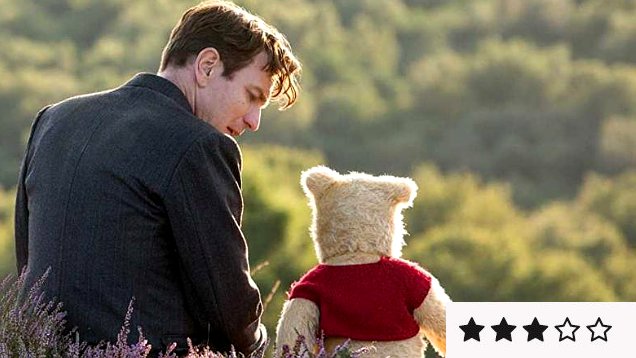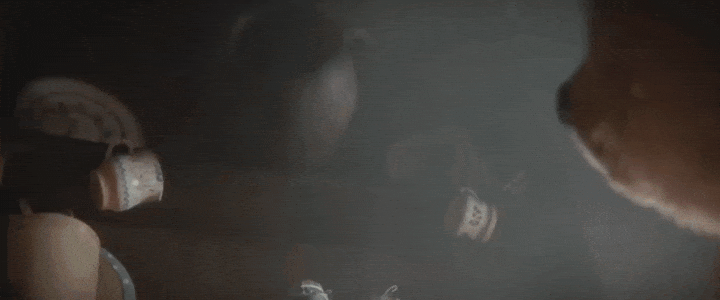Christopher Robin review: a sweet story about releasing your inner child

Christopher Robin contains a melancholic image of Winnie-the-Pooh standing alone at the head of a dirty and dilapidated outdoor dinner table, with no friends and no company. It evokes the macabre 1985 headtrip Return to Oz, which follows a catatonic and ECT-treated Dorothy Gale to a crumbling yellow brick road and the remnants of a destroyed Emerald City. Oz is a film about childhood ruined by the pernicious forces of adulthood, an idea Christopher Robin chips away at from a different, hopeful perspective – proposing that the purity of our formative years can restore the moral and creative equilibrium of a cruel grown-up world.
Director Marc Foster begins with beautiful musty looking animation inspired by E.H. Shepard’s illustrations in A.A. Milne’s children’s books. We see pictures of the gang (Pooh, Tigger, Piglet etc) and details of one of their adventures, before text appears declaring that “the day finally arrives, as it does with all childhood, to say goodbye.” Foster reiterates this message twice, literally spelling it out on two subsequent occasions despite literally spelling it out the first time – with a ‘goodbye Christopher Robin’ tea party (appropriately labelled in signage) and the introduction of “Chapter 1, In Which Christopher Robin Leaves His Childhood Behind.”

The repetition would rankle if the film weren’t so quick to its feet. Foster flips through key moments in the life of Robin, played in adulthood by Ewan McGregor: the death of his father; meeting future wife Evelyn (Hayley Atwell); serving in the Second World War; returning home to London and getting a job. All this transpires as the opening credits are appearing, demonstrating impressive narrative economy. A shot of Robin closing the door of his study while his wife and daughter Madeline (Bronte Carmichael) dance jovially in the adjacent room marks more pithiness; from that brief image we understand the protagonist is work-obsessed and disconnected from his family.
This leads, like in the recent Milne biopic Goodbye Christopher Robin – a less interesting, overwrought film – to a Cats in the Cradle narrative about the importance of family. Pooh returns to a forlorn Robin while he is resting on a park bench feeling sorry for himself, conflicted by the latest Very Adult thing he has to do in a Very Adult World: leading a downsizing initiative at his place of employ. A crabby Robin determines he has no time for shenanigans, honey-related or otherwise, and resolves to return his old anthropomorphised stuffed friend to the Hundred Acre Wood – only to trigger a ‘getting the band back together’ narrative incorporating the usual suspects.
Foster has to work hard to avoid overdosing on sentiment, while heeding the warning at the core of the film: that it is easy to be adult and cynical
Foster has to work hard to avoid overdosing on sentiment, while heeding the warning at the core of the film: that it is easy to be adult and cynical. The dunderheaded Pooh is, refreshingly, a rather annoying presence for Robin, who is frustrated by the same easygoingness and nonchalance that would have appealed to him as a child. Before the inevitable crowd pleasing finale arrives, the director affords the two characters space to reconnect in poignant circumstances, wandering through a now misty forest – with Robin pondering whether it always looked this gloomy. The pared-back colours of Matthias Koenigswieser’s cinematography reflect an approach bold in its wistfulness.
Robin is a naysayer who makes Scrooge-like grumblings about the responsibilities of being an adult in the ‘real’ world; anybody can sense an epic about-face coming a mile away. The drama in Christopher Robin is often one-note in its constant riffing on the forsaken inner child. Foster doesn’t get far in his obvious attempts to evoke symbols and social commentary (unlike the superior Paddington movies) and his heavy-hearted handling reduces the impact of the slapstick elements. But one can hardly criticise the director for thinking deeply. On the numerous occasions that Pooh is derided by Robin for being a “silly old bear”, it feels – to the film’s credit – less like a term of endearment than a genuine grievance.

















